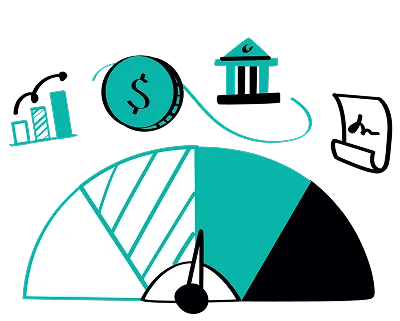While we all know the famous adage, “Change is inevitable.”
In order to grow, to adapt, and to thrive, we must embrace change rather than resist it.
When it comes to the world of financial advising, change comes in a variety of forms, specifically the adoption of new services to better meet the needs of your clients.
Adding estate planning services to your list of financial tools is one of the best things you can do today to secure the future of your firm and your clients’ long-term financial goals.
- Financial planners can play a large role in estate planning once the legal document creation is complete.
- Estate financial planning software is an important part of the estate planning process, as it allows for document storage and security, as well as providing seamless integration with financial accounts, beneficiary information, and tax planning strategies.
- Choosing the best estate planning software can be challenging, if you don’t know what to look for and what to avoid.
As a financial planner, you play a critical role in helping clients navigate their financial futures, ensuring they make informed decisions about everything from their current budgetary decisions to their long-term wealth management plans.
In past years, financial planners may have been more focused on budgeting, portfolio allocation, and tax strategies, leaving the estate planning up to law firms that specialized in trusts and wills.
However, as the financial planning industry takes on a more holistic approach, many advisors are recognizing the value of expanding their services into estate planning—a natural extension of financial management that helps clients protect their wealth for future generations.
Integrating estate planning into your practice doesn’t mean replacing an estate planning attorney—it means working alongside them to ensure seamless execution of financial strategies after documents are drafted.
To make this transition smooth and scalable, adaptable software designed for estate planning can be a game-changer, allowing financial planners to efficiently add this client service while also maintaining compliance and accuracy throughout the process.
Built by CFP® Professionals,
for CFP® Professionals
Holistiplan was designed by experienced advisors Roger and Kevin to streamline your financial planning process. Achieve more for your clients in less time
Start Your Free 7-Day TrialThe Core Responsibilities of a Financial Planner
Before diving into estate planning, it’s important to identify the key tasks financial planners already manage for their clients.
These include:
Investment Management
Financial planners help clients build diversified portfolios that align with their risk tolerance, time horizon, and financial objectives.
This includes monitoring market trends, adjusting asset allocations, and identifying opportunities for long-term growth while minimizing risk.


Retirement Planning
Structuring post-retirement financial strategies ensures clients have a steady income stream when they leave the workforce.
Advisors guide them through 401(k) rollovers, Roth vs. traditional IRAs, pension plans, and Social Security optimization, ensuring retirement savings last throughout their lifetime.
Tax Planning
Effective tax planning helps clients legally reduce taxable income, maximize deductions, and leverage tax-efficient investment strategies.
Financial planners advise on methods like harvesting losses, charitable giving, and optimizing estate tax considerations to preserve more wealth.


Insurance Planning
Protection against unexpected financial burdens is a key pillar of planning.
Advisors ensure clients have sufficient coverage for life, health, disability, and long-term care insurance, safeguarding their finances against sudden disruptions like medical emergencies or loss of income.
Debt and Cash Flow Management
Helping clients manage debt ensures long-term stability and financial security.
Advisors assist in debt reduction strategies, refinancing options, and building sustainable budgets to improve financial health while maintaining liquidity for future investments.


Business Succession Planning
For business owners, a well-crafted succession plan protects their legacy and ensures a smooth transition of ownership in case of retirement, disability, or unforeseen circumstances.
Advisors help structure client meetings with other experts that may be needed for buy-sell agreements, leadership transitions, and financial strategies to maintain business continuity.
Risk Management and Asset Protection
Advisors help clients identify potential financial risks, such as market volatility, liability exposure, and unexpected life events.
By implementing diversification strategies, umbrella insurance policies, and asset protection plans, financial planners ensure long-term security for their clients and their families.

While these are all extremely important pieces of a solid financial plan, estate planning is the missing piece—the proactive strategy that ensures wealth is protected and transferred according to a person’s wishes.
The Intersection of Estate Planning and Financial Advising
Many financial planners recognize estate planning as an essential part of comprehensive wealth management, but hesitate to integrate it into their practice.
They may see it as an area of expertise reserved for estate attorneys and/or may feel they don’t have the adequate legal practice management platform to handle estate planning effectively.
While financial advisors are not expected to draft wills, trusts, or legal documents, they do play a pivotal role in aligning the financial aspects of an estate plan with their clients’ broader wealth strategies.
Let’s look at the key contributions that a financial planner brings to a client’s estate planning needs:
Identifying Estate Planning Needs – Advisors work with clients to assess their financial status and determine what estate planning tools—such as wills, trusts, or charitable giving strategies—are most appropriate.
Coordinating With Estate Attorneys – Working with legal professionals, advisors can serve as the estate administration, ensuring financial accounts, tax strategies, and asset distribution are all updated and align with legal documents drafted by attorneys.
Managing Beneficiary Designations – Advisors ensure that retirement accounts, insurance policies, and investment portfolios have correct and updated beneficiaries.
Advising on Wealth Transfer Strategies – A experienced advisor can help to streamline processes and minimize estate taxes, ensuring efficient inheritance distribution takes place.
Educating Clients on Estate Planning Options – Clarify what trusts, powers of attorney, and guardianship arrangements mean in relation to their financial assets.
Helping Clients Avoid Probate Pitfalls – Financial planners are adept at advising clients on ways to streamline asset transfers to beneficiaries, reducing tax liabilities and legal hurdles.
With this holistic approach to estate planning, a financial planner can serve as a trusted partner in a client’s future, ensuring their estate plan aligns with long-term financial goals and works seamlessly with investment strategies.
Elevate Your Practice with Holistiplan
Holistiplan is trusted by thousands of advisors to deliver faster, more valuable financial plans. Start your free 7-day trial and see the difference for yourself
Get Started TodayThe Power of Adaptability: What to Look for in Estate Planning Software
While financial planners may understand the importance and the benefits of estate planning, integrating it into their practice requires efficiency, accuracy, and compliance.

This is where estate planning software becomes indispensable.
The right software allows financial professionals to manage estate plans with ease, ensuring that every aspect of a client’s wealth is aligned, secure, and optimized for future financial goals.
Here are some key features you will want when choosing estate planning software to add to your already robust financial planning toolkit:
- Seamless Integration with Financial Planning Tools – The best estate planning software connects effortlessly with all your client data tools, such as your CRM software, tax planning tools, and investment portfolios, in order to provide a holistic view of a client’s assets.
- Customizable Estate Models and Projections – Look for software that allows for scenario analysis, helping clients visualize different estate strategies, tax implications, and wealth transfer options.
- Secure Document Management and Compliance Tracking – Strong encryption and security protocols ensure that sensitive estate planning documents are stored in secure client portals while maintaining compliance with evolving financial and legal regulations.
- Automated Beneficiary and Asset Tracking – A system that tracks beneficiary designations, trust assets, and financial account ownership in real-time ensures estate plans remain accurate and up-to-date.
- Advanced Reporting and Visualization Tools – Clear, data-driven reports and visual estate planning breakdowns help clients and advisors make more informed decisions about wealth distribution.
- Collaboration Features for Family Members, Attorneys, and Clients – Look for cloud-based software that enables secure communication between financial planners, estate attorneys, and clients, ensuring seamless coordination.
- Built-In Tax and Wealth Transfer Strategies – Estate planning isn’t just about inheritance—it’s also about minimizing tax burdens. Software that integrates tax-saving strategies ensures clients maximize their legacy while avoiding unnecessary liabilities.
- User-Friendly Interface and Client Education Tools – A platform that offers exceptional service and client-friendly communication makes it easier for individuals to engage with their estate planning process, making client relationships more solid than before.
By choosing the right estate planning software for your overall firm’s operational efficiency, you can streamline workflows, enhance collaboration, and ensure clients receive comprehensive, well-structured guidance on wealth transfer and legacy planning.
Building Your Best Tech Stack is Possible with Holistiplan
As a financial advisor, your success depends on having the right tools to streamline workflows, enhance client insights, and optimize financial strategies.
Holistiplan is an estate and tax planning software platform—and is a key component of a well-rounded tech stack.
With features designed by CFP® professionals, Holistiplan simplifies complex tax analysis, improves estate planning accuracy, and empowers advisors to provide proactive financial planning with ease.
By incorporating Holistiplan into your firm, you’re not just keeping up with industry demands—you’re leading the way in delivering smarter, more effective financial strategies.
Estate planning is undergoing a digital transformation, and financial firms must stay ahead of technology trends to remain competitive.

Holistiplan embraces these changes, continuously innovating to ensure advisors have access to cutting-edge estate and tax planning solutions that more clients are asking for.
Our expert in-house team works hard to create the most advanced and intuitive software solutions available today, while continuing to prepare for what’s on the horizon tomorrow.
With Holistiplan, you can ensure that every client has the most comprehensive financial plan, no matter what stage of life they are in.
Future-proof your practice, strengthen client relationships, and build a tech stack that works for you. Start using Holistiplan today and take your financial planning services to the next level.
Efficiency Meets Value in Financial Planning
Holistiplan bridges the gap between speed and quality, helping advisors like you deliver greater value to every client





